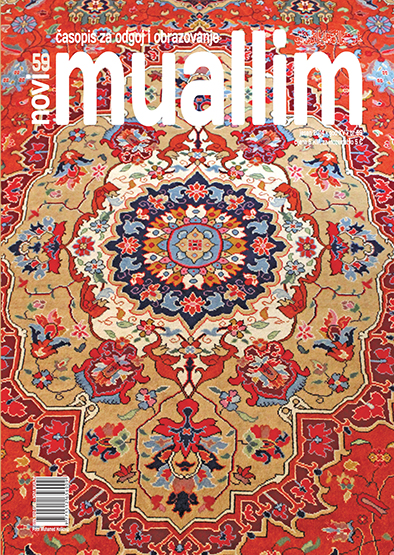DINAMICS OF CHANGES AND EXPECTATIONS IN TWENTY YEARS PERIOD OF RELIGIOUS STUDIES IN SCHOOLS
DOI:
https://doi.org/10.26340/muallim.v15i59.217Keywords:
qualitative research, Islamic religious studies, dynamics and changes, Teaching plan and program, textbooks, Religious studies teachersAbstract
UDK 37.011.33:28]
28:37.011.3-051
The aim of the article is presenting the process of implementation, development and current trends of the Islamic religious studies in schools. The procedure of this research itself was determined by the issue of changes of the comprising elements of the teaching process (namely: teaching plan and program, textbooks and the status of the school subjects and professional profile of religious studies teachers). As a strategy of gathering the empirical data for the research, the method of expert interview was used. Relevant experts were interviewed in the context of bringing the Islamic religious studies back to schools: university professor, representative of the Islamic Community of Bosnia and Herzegovina and a teacher of religious studies. In the evaluation process the method of qualitative content analysis was used. The research results indicate that the turning point in formal status and significance of the Islamic religious studies happened in year the 2003, when the Outline law was passed relating to primary and high-school education regulating the status of Religious studies as a school subject. On the other hand, in the dynamics of Teaching plan and program of Religious studies, the year 2005 marks the beginning of reforms of TPP of Islamic religious studies with the reference to the concept of “open curriculum”. Envisioned continuum of the approach in planning the class is defined by the two end points: transmission program orientation and transformation transaction program orientation. However, even though the status of religious studies teachers within the school system is improved in the last two decades, the issue of strategic definition of their education that would respond to increasing challenges still remains.
Downloads
Published
How to Cite
Issue
Section
License
Naknada:
a. Časopis ne naplaćuje naknadu za obradu članaka (APC) i naknadu za podnošenje članaka.
Autori koji objavljuju u ovom časopisu pristaju na sljedeće uvijete:
- Autori zadržavaju autorska prava i pružaju časopisu pravo prvog objavljivanja, pri čemu će rad jednu godinu po objavljivanju biti podložan licenci Creative Commons imenovanje koja omogućuje drugima da dijele rad uz uvijet navođenja autorstva i izvornog objavljivanja u ovom časopisu.
- Autori mogu izraditi zasebne, ugovorne aranžmane za ne-ekskluzivnu distribuciju rada objavljenog u časopisu (npr. postavljanje u institucionalni repozitorij ili objavljivanje u knjizi), uz navođenje da je rad izvorno objavljen u ovom časopisu.


